九年级英语全册Unit3Couldyoupleasetellmewheretherestroomsare写作作业课件新版人教新目标版
郑州市九年级英语全册Unit3Couldyoupleasetellmewheretherestroo
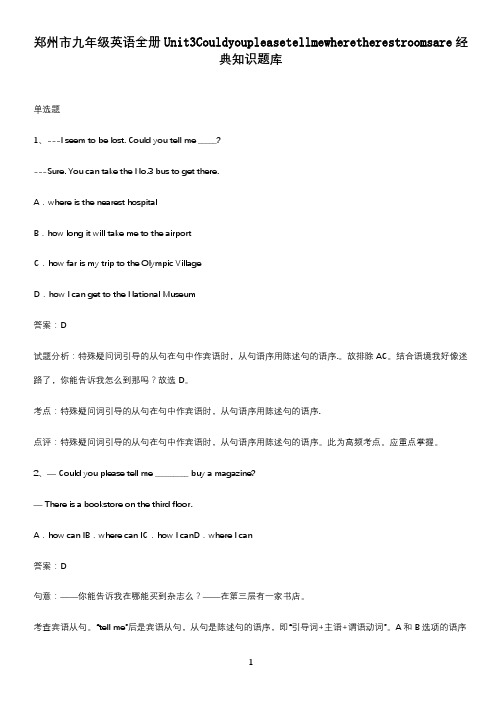
郑州市九年级英语全册Unit3Couldyoupleasetellmewheretherestroomsare经典知识题库单选题1、---I seem to be lost. Could you tell me _____?---Sure. You can take the No.3 bus to get there.A.where is the nearest hospitalB.how long it will take me to the airportC.how far is my trip to the Olympic VillageD.how I can get to the National Museum答案:D试题分析:特殊疑问词引导的从句在句中作宾语时,从句语序用陈述句的语序.。
故排除AC。
结合语境我好像迷路了,你能告诉我怎么到那吗?故选D。
考点:特殊疑问词引导的从句在句中作宾语时,从句语序用陈述句的语序.点评:特殊疑问词引导的从句在句中作宾语时,从句语序用陈述句的语序。
此为高频考点。
应重点掌握。
2、— Could you please tell me _________ buy a magazine?— There is a bookstore on the third floor.A.how can IB.where can IC.how I canD.where I can答案:D句意:——你能告诉我在哪能买到杂志么?——在第三层有一家书店。
考查宾语从句。
“tell me”后是宾语从句,从句是陈述句的语序,即“引导词+主语+谓语动词”。
A和B选项的语序错误。
根据“There is a bookstore on the third floor”可知从句表达“在哪里能买到杂志”,用疑问词“where”引导从句。
故选D。
3、— What kind of books do you like best?— I like books ________ are about science and technology.A.whoB.whomC.which答案:C句意:——你最喜欢什么类型的书?——我喜欢关于科学和技术的书。
九年级英语全册 Unit 3 Could you please tell me where the
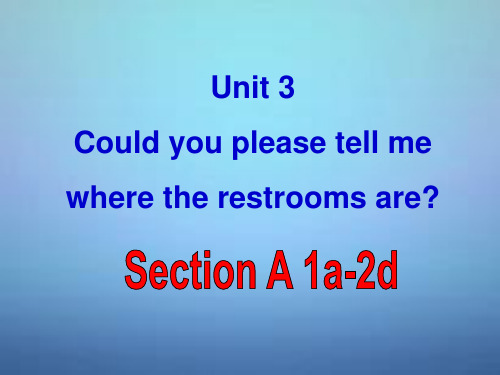
Listen and fill in the blanks
1. buy
2.some
3. medicine 4.shopping
5. center
6. the
7. second
8. floor
9. turn
10. left
11. go
12. past
13. between 14.one
15. more
we start with ? There’s Space World, Water World, Animal World ...
Could you please tell me how to get to the library?
Sure, just go long the central avenue,then turn right at the second crossing. It is on First street, right on your left.
拓展:
• Could you please do sth.? • Would/Will you please do sth.? • Would you like to do sth.? • May/Can/Could I do sth.? 肯定回答常用:Sure./Of course./ No problem./
2a Listen. You will hear some of the directions below. Number the directions in the order that you hear them.
____ Go to the third floor.
__2__ Turn left . __1__ Go to the second floor.
九年级英语全册 Unit 3 Could you please tell me where the
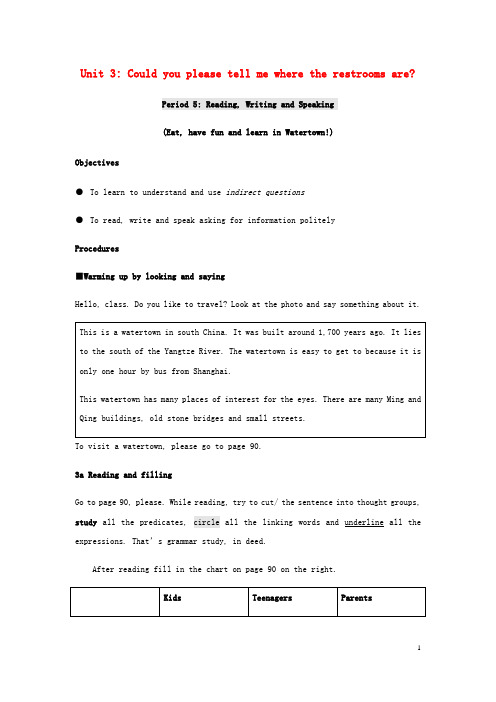
Unit 3: Could you please tell me where the restrooms are?Period 5: Reading, Writing and Speaking(Eat, have fun and learn in Watertown!)Objectives●To learn to understand and use indirect questions●To read, write and speak asking for information politelyProcedures■Warming up by looking and sayingHello, class. Do you like to travel? Look at the photo and say something about it.To visit a watertown, please go to page 90.3a Reading and fillingGo to page 90, please. While reading, try to cut/ the sentence into thought groups, study all the predicates, circle all the linking words and underline all the expressions. That’s grammar study, in deed.After reading fill in the chart on page 90 on the right.Now read the text again to turn it into a conversation.3b Reading and completingOn page 90 is an unfinished tour guide to Sunville. Now turn back to 2a and 2b for information to finish it.3c Write a guide to your city or townMY HOMETOWN: TAIYUANTaiyuan, the capital city of Shanxi Province, lies in the north part of Middle Jinand crosses the River Fen. The city area has three parts, one smaller city and five counties. The history of the city can go back to over 2,400 years ago. It was set up in 497 BC, the end of the Spring and Autumn Period and was named Jinyang, the northern bank of the Jin River. In Chinese, the northern bank of waters is called yang. In 982, Song Taizong, Zhao Kuangyi, the second emperor of the Song Dynasty burned and flooded Jinyuan City. After that, he ordered one of the officials, Pan Mei to build Taiyuan City in Tangming Town, north of Jinyuan City. Thus, came the present Taiyuan City. Taiyuan, in Chinese, means the greatest plain. In fact, around it there are many high mountains and hilly areas. Only one-fifth of the whole area is plains. Taiyuan has coal and iron, so it has the name, "the home of coal and iron." Taiyuan is nice in climate. It is not dry and cold in winter, not hot and rainy in summer, not dusty and windy in spring. But it is cool and comfortable in autumn.4 Grouping and speakingOne of the group members is to role play the information booth worker, and the others are the tourists. The tourists are asking about your city.。
Go_for_it版九年级英语Unit_3_Could_you_please_tell_me_where_the_restrooms_are

Could you please tell me where the bookstore is?
问路的常见句型:
• Excuse me . Could/Can you tell me the way to ..? • Excuse me . Could/Can you tell me how I can get to..? • Excuse me . Could/Can you tell me how to get to..? • Excuse me .Do you know where/how..? • Excuse me . Could/Can you tell me where..?
Could you please tell me how we can get there?
Airport
P a r k Chinese restaurant
Fire station
Our school R i v e r
Hospital
Supermarket
s t r e e t
Post office s t r Library Bus station e e t Department Hotel store
Killeen’s Café
Daily’s department store
Center Βιβλιοθήκη treetMain Street
library
post office
Lucy: Excuse me. Could you please tell me where I can buy toothbrush?
Stranger : Sure. There’s a department on Cente Street.
河南省九年级英语全册Unit3Couldyoupleasetellmewheretherestroo

河南省九年级英语全册Unit3Couldyoupleasetellmewheretherestroomsare知识点总结归纳完整版单选题1、-Could you tell me _________? -Talking about festivals.A.how they are playingB.what they are doingC.where they are goingD.why they are practicing答案:B分析:考点:考查宾语从句。
试题分析:句意:你能告诉我他们正在做什么吗?——谈论节日。
结合答语"正在谈论节日”可推断,问句应是询问正在做什么;what什么;where哪里;how怎样;why为什么;故答案为B。
2、—Susan, how was your party?—Pretty good. We sang and danced ________ all night.A.happilyB.hardlyC.politelyD.clearly答案:A句意:——苏珊,你的派对怎么样?——很好。
我们整夜快乐地唱歌跳舞。
考查副词辨析。
happily快乐地,高兴地;hardly几乎不,几乎没有;politely有礼貌地,斯文地;clearly清晰地,清楚地。
根据上文“Pretty good”可知是高兴地唱歌跳舞;故选A。
3、The high speed train Qingdao and Beijing travels faster now. The train ride takes only about three hours. A.fromB.amongC.inD.between答案:D句意:青岛到北京的高速列车现在开得更快了。
乘坐火车只需要三个小时。
A. from从……起,来自;B. among在(其)中,……之一;C. in在……里;D. between在两者之间。
九年级英语全册 Unit 3 Could you please tell me where the
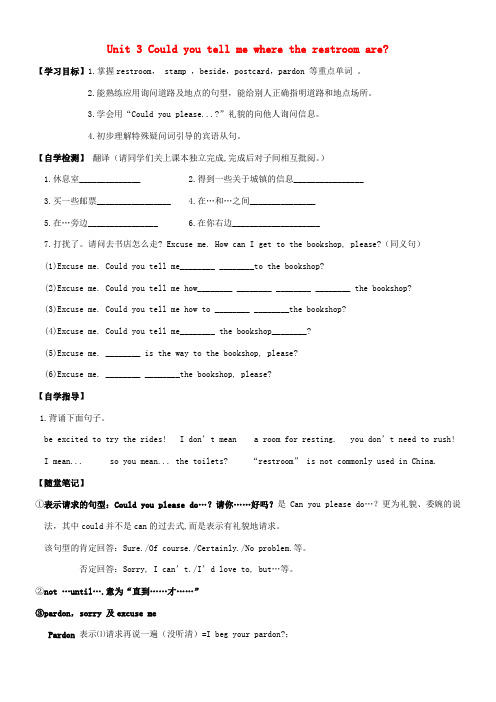
Unit 3 Could you tell me where the restroom are?【学习目标】1.掌握restroom, stamp ,beside,postcard,pardon 等重点单词。
2.能熟练应用询问道路及地点的句型,能给别人正确指明道路和地点场所。
3.学会用“Could you please...?”礼貌的向他人询问信息。
4.初步理解特殊疑问词引导的宾语从句。
【自学检测】翻译(请同学们关上课本独立完成,完成后对子间相互批阅。
)1.休息室______________2.得到一些关于城镇的信息________________3.买一些邮票_________________4.在…和…之间_______________5.在…旁边________________6.在你右边____________________7.打扰了。
请问去书店怎么走? Excuse me. How can I get to the bookshop, please?(同义句)(1)Excuse me. Could you tell me________ ________to the bookshop?(2)Excuse me. Could you tell me how________ ________ ________ ________ the bookshop?(3)Excuse me. Could you tell me how to ________ ________the bookshop?(4)Excuse me. Could you tell me________ the bookshop________?(5)Excuse me. ________ is the way to the bookshop, please?(6)Excuse me. ________ ________the bookshop, please?【自学指导】1.背诵下面句子。
人教新目标九年级全一册Unit 3 Could you please tell me where t

4. ICsotuhledIytaoluiatnelrl emsteawurhaentht enreathrbeyItoaplieann reosntaMuroandt anye?arby open on Monday or not?
1. Excuse me, could you tell me where is the train station?
2. Pardon me, could you tell me how to get to a nearby restaurant?
3. Do you know where I can get some money?
4b What should each person ask in the following situations?
1. TCiomuldisyhouuntgerllym. e where I can get
something to eat?
2. SEaaxllecltyutsneerem?edes, ctoanmyaoiul atelleltmteer.how to mail 3. HPaerldenonnmeeed, sdotoykonuokwnowwhwehnetnhtehbeikbeike
中的主语、谓 I wonder if they will have the races again 语、宾语从句 n宾ex语t y从ea句r. (objective clauses)
I w在o复nd合er句w中he,th由er 一Jun个e_i句s__a子_g_o充od当ti_宾m__e语_t_o, vi这sit个H句on子g K叫on做g.宾语从句。引导宾语从句 I b的el常iev见e关th联at 词Ap有ril_tih_sa_tt_h,e_hi_fo_t,twe_s_ht_em_th_o_enr_t,h in Th_wa_hi_la_tn_d, ._w_h__y_,w_h__er_e_, _h_o_w___等
Unit3Couldyoupleasetellmewheretherestroomsare重点短语句

人教版英语九年级全册第三单元重点短语、句子及其运用Unit 3 Could you please tell me where the restrooms are?1、Could you please tell me where the restrooms are?你能告诉我厕所在哪儿吗?这是一个典型的宾语从句引导特殊疑问句的情况。
原特殊疑问句是:Where are the restrooms? 改为宾语从句以后,变成了陈述语序:Where the restrooms are?2、Excuse me , could you please tell me where I can buy some stamps?打扰一下,你能告诉我在哪儿可以买到一些邮票吗?注意:当要向别人寻求帮助或者提问时,要用Excuse me开头,表示礼貌。
又如:Excuse me , I wonder where there is a restroom? 打扰一下,我想知道哪儿有一个洗手间?3、Sure , just go along Main Street until you pass Center Street.当然,只需要沿着主干道走,直到你经过中心街。
Until直到,有时候也可以用till代替。
另外,until还广泛用于not…until结构中,表示“直到…才”,例如:I won’t give up until I succeed. 我不会放弃,直到我成功为止。
4、Do you know when the bookstore closes today?你知道今天书店什么时候关门吗?这是一个由Do you know 引导特殊疑问句的情况。
另外,还要注意close除了本句中的“关”这个意思,还可以表示“近的、接近的”,常用于短语“be close to…中”。
例如:The supermarket is close to my house , it’s convenient for us to go shopping. 这个超市离我家很近,对我来说去购物是方便的。
人教版九年级英语全册 Unit 3 Could you please tell me where the restrooms are 复习题及答案

Vocabulary Nounn.洗手间;公共厕所n.邮票;印章n.书店n.明信片n.洗手间;厕所n.浴室n.仓促;急促n.管理人员;职工n.葡萄n.邮件;信件n.商场n.职员n.拐角;角落n.要求;请求n.方向;方位n.发言者n.住址n.地铁n.课程;学科_n.意大利人(语)_ n.东方Verbv.原谅_ v.仓促;急促v.建议;提议v.邮寄v.要求;请求Adjectiveadj.中心的,中央的adj.附近的adj.东方的;东部的adj.不昂贵的adj.不拥挤的adj.便利的;方便的adj.正确的;恰当的__________adj.有礼貌的___________adj.不礼貌的;粗鲁的adj.意大利人的Adverbadv.在附近;附近adv. 向东;朝东adv.礼貌地;客气地adv..通常其他prep.在......旁边pron.谁;什么人Phrase1. 向左/右转2. 在某人的左/右边3. 沿着…走4. 在第三楼5. 请再说一次6. 在去.......的路上7. 路过8. 在购物中心9. 在某些场合10. 停车11. 例如12. 为…感谢某人13. 期盼做某事…14. 第一次见到某人15 做某事很方便Structure①Pardon? Restroom? You want to rest?1 -Let's go to the Water World for a trip tomorrow,OK?-________ Where did you suggest going?()A.Pardon me.B.I don't know.C.I agree with you.D.It sounds terrible!2 -The game is too hard for me.I will certainly lose.()-You never say no before you try.__________A.forget it! B.I'm sorry.C.Come on!3 -Excuse me,can you tell me the way to the Summer Palace?-___________.You can ask the policeman over there.()A.Have a good time B.No,thanksC.Sorry,I'm new here D.Yes,of course4 ---Excuse me,is there a police station in the neighborhood?--- ______?I didn't hear you clearly.()A.Forget it B.PardonC.How come D.How do you do5 -______,where is the new Taiyuan Railway Station?-I'm sorry.I am a stranger here.()A.Hello B.No problem C.Come on D.Pardon me 6 -I'm not good at dancing,you know.-_____ It's just for fun.()A.Well done! B.No way!C.Good luck! D.No problem.7 --_______.Could you tell me where there's a good place to eat?--_________.Turn left and the restaurant is near the bank.()A.Hi; RightB.Excuse me; Of courseC.Hello; That's all rightD.Good night; Sure②Both are correct, but the first one sounds less polite.1 ---Does my question sound _______enough?---I don't think so.You can ask more _______by using"could"instead of"can".()A.politely;politely B.politely;politeC.polite;politely D.polite;polite2 The Internet has made communication much more .- I agree. For example, I can communicate with my friends on WeChat any time.()A.popular B.necessary C.important D.convenient3 One of the most______ways to get around a city is to take a taxi.()A.convenient B.serious C.difficult D.expensive4 Summer is coming.The days are getting ________.()A.long and long B.long and longerC.more and more long D.longer and longer5 A new car is much ___ than a secondhand one in the same brand (品牌) and model (型号).()A.cheap B.cheaperC.expensive D.more expensive③It is not enough to just ask a question correctly.1. 你真聪明, 解出了这道数学题。
人教版英语九年级全一册Unit 3听力原文及翻译
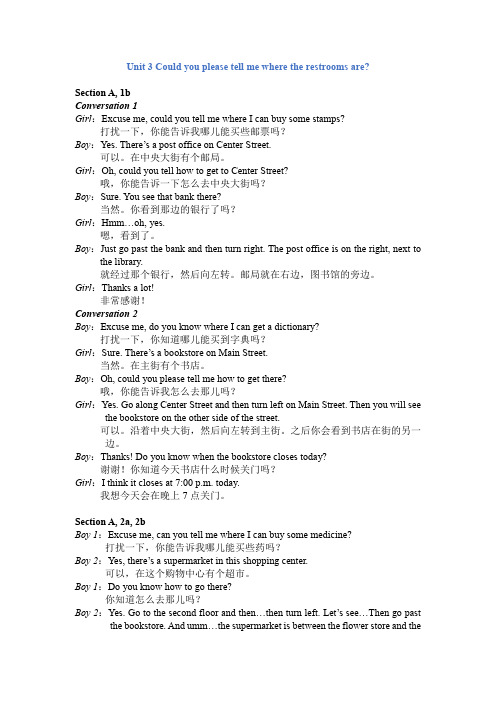
Unit 3 Could you please tell me where the restrooms are?Section A, 1bConversation 1Girl:Excuse me, could you tell me where I can buy some stamps?打扰一下,你能告诉我哪儿能买些邮票吗?Boy:Yes. There’s a post office on Center Street.可以。
在中央大街有个邮局。
Girl:Oh, could you tell how to get to Center Street?哦,你能告诉一下怎么去中央大街吗?Boy:Sure. You see that bank there?当然。
你看到那边的银行了吗?Girl:Hmm…oh, yes.嗯,看到了。
Boy:Just go past the bank and then turn right. The post office is on the right, next to the library.就经过那个银行,然后向左转。
邮局就在右边,图书馆的旁边。
Girl:Thanks a lot!非常感谢!Conversation 2Boy:Excuse me, do you know where I can get a dictionary?打扰一下,你知道哪儿能买到字典吗?Girl:Sure. There’s a bookstore on Main Street.当然。
在主街有个书店。
Boy:Oh, could you please tell me how to get there?哦,你能告诉我怎么去那儿吗?Girl:Yes. Go along Center Street and then turn left on Main Street. Then you will see the bookstore on the other side of the street.可以。
郑州市九年级英语全册Unit3Couldyoupleasetellmewheretherestroo

郑州市九年级英语全册Unit3Couldyoupleasetellmewheretherestroomsare易混淆知识点单选题1、—Who ________ the way ________ the hotel?—The boy in red. He is warm-hearted.A.lead; toB.led; toC.will lead; intoD.has led; into答案:B句意:——谁带路去的旅馆?——穿红色衣服的那个男孩。
他很热心。
考查动词时态。
根据“The boy in red. He is warm-hearted.”及语境可知,男孩已经带路了,故应该用一般过去时。
lead“带领”,其过去式是led。
故选B。
2、In the picture, he sits ______me, looking very happy.A.besideB.amongC.upD.through答案:A句意:在这张照片中,他坐在我的旁边,看上去非常高兴。
本题考查介词。
A. beside在···旁边; B. among 在··中;C. up 向上;D. through穿过。
根据句意选A.3、—______ is it from your home to your school?—It is about 10 minutes' ride.A.How longB.How soonC.How farD.How often答案:C句意:——从你们家到学校有多远?——大约十分钟的车程。
A. How long多长时间,用来询问时间长短;B. How soon多久以后,对将来的一段时间提问;C. How far多远,用来询问距离远近;D. How often多久一次,用来询问频率。
根据答语可知,问句是询问距离,故答案为C。
4、He has a collection of________. He can not only enjoy them but also use them to mail letters. A.stampsB.novelsC.instrumentsD.magazines答案:A。
人教版(新目标)九年级全册Unit 3 Could you please tell me where

Unit 3 Could you please tell me where the restrooms are?-Section A 3a【学习目标】1.熟练掌握Unit 3 Section A的重点词汇,短语和句型。
2.能够理解Unit 3 Section A 3a部分短文的大概意思。
【学习过程】Step 1: 自主学习----明确目标自学文本任务一:请同学们课前上平台阅读思考本节预习案,明确本节课的学习任务和目标。
任务二:对照课本后面第一单元的单词表(158)跟读单词录音。
要求:根据录音及单词音标,首先会读单词接着边读边写记单词,注意中英文的转换,最后默写单词。
任务三:自学教材①播放音频完成课本17-18听力练习②跟19页3a音频大声朗读课文,理解文章大意,划出不理解的地方。
阅读3a,判断句子正(T)误(F)。
()1. Alice suggests going on the new ride, but He Wei thinks it looks scary.()2. According to the conversation, Alice and He Wei don't go on the new ride.()3. Alice is getting hungry and wants to get some food.()4. Alice and He Wei pass by Uncle Bob's on their way to Water City Restaurant.()5. The band starts playing at seven o'clock this evening.Step 2: 自学检测----在线测学质疑思学在线测学:请你在平台完成以下自学检测(Unit 3-Section A自学检测),提交后自己看错题及解析。
自学检测一、单词冲关1. 邮票;印章n. ________2. 在……旁边;在……附近prep. ________3. 原谅v. 请再说一遍interj. ________4. 仓促;急促v. & n. ________5. 建议;提议v.________→(派生词)建议;提议n. ___________6. 中心的;中央的adj. ________→(同根词)中心;中央n. ________7. 东方的;东部的adj. 向东;朝东adv. 东;东方n. ________二、短语冲关1. 在某人的右边____________2. 向左/右转____________3. 在……和……之间________________4. 在某人去……的路上________________5. 路过;经过____________6. 一双;一对____________7. need to do sth. ____________8. come on ____________9. get to ____________10. at that time ____________三、句型冲关1. 打扰一下,请问你能告诉我怎样去书店吗?Excuse me, could you please tell me ________ ________ ________ to the bookstore?2. ……只需沿着主街走,直到你经过中心大街。
九年级英语全册-Unit-3-Could-you-please-tell-me-where-the-
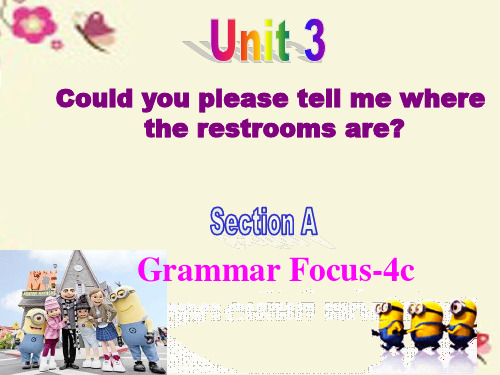
Can you tell us _w__h_e_n_ __th_e_ __b_a_n_d_ __s_t_ar_t_s playing this evening? 6. 晚上8点开始。 It _s_t_a_rt_s_a_t__ 8:00 p.m. 7. 我想知道接下来我们该去哪儿。
I _w_o_n_d__er_ ห้องสมุดไป่ตู้here we _s_h_o_u_l_d_ ___g_o_ __n_e_x_t. 8. 你应该试试那个新的乘骑设施。
You should try __th_a_t_n_e_w_ _r_id_e_ _o_v_e_r _th_e_r_e_.
4a
Rewrite the questions to make them more polite. 1. Where can I buy some grapes or other fruits?
Could you tell me how to get to the Central Library?
4. Is the Italian restaurant nearby open on Mondays?
Could you tell me whether the Italian restaurant nearby is open on Mondays or not?
1. 打扰了,你知道我能在哪买到一些药? Excuse me, do you know where __I__ _c_a_n__ buy some medicine?
2. 当然,顺着这条街有个超市。 Sure. There’s a supermarket d_o_w__n__th_e_s_t_re_e_t.
九年级英语全册 Unit 3 Could you please tell me where the

Unit 3 Could you please tell me where the restrooms are 一、单项选择1.—Excuse me, madam. Could you please tell me ________ thebus arrives?—Sure. At 9:00.(资阳)A.where B.when C.why D.how2.—Could you tell me ________ ?—Sure.(常德)A.where the restrooms areB.where are the restroomsC.where is the restroom3.—Excuse me, do you know ________?—Sure, there is a bookstore down the street near here.(黄冈)A.where can I get some postcardsB.where I can get some postcardsC.how can I get some postcardsD.when I can get some postcards4.The teacher told us that the sun always ________ in the east.A.had risen B.has risenC.rose D.rises5.—Excuse me, Miss C hen, could you tell me ________?—It is short for the Silk Road Economic Belt and 21st Century Maritime Silk Road.(福州)A.what the Belt and Road meantB.what does the Belt and Road meanC.what the Belt and Road means6.Could you tell me ________ a moment ago? (广州)A.what were they talking aboutB.what are they talking aboutC.what they were talking aboutD.what they are talking about7.—I'd like to know ________.—Maybe in the forest.(重庆A)A.whether we will go campingB.where we will go campingC.whether will we go campingD.where will we go camping8.Could you please tell me ________?(绥化)A.how can I get to the post officeB.how I can get to the post officeC.where is the post office9.—Excuse me. Do you know ________?—Well, go along this street and turn right. There's one on the left.(济南)A.how can I get to the bankB.where I can find a restaurantC.when he usually gets to workD.where is the police station10.We don't know________ it next. Let's go and ask Mr. Li.A.what to doB.to do whatC.whether to doD.to do whether二、句型转换11.Could you tell me how I can go to th e bank? (改为简单句) Could you tell me _________________________________?12.Do you know?Whom will you go with? (合并为一句)Do you know_____________________________________?13.He told me. When will he leave the city?(合并为一句)He told me___________________________________.14.“Why do you study so hard?” I as ked Alice.(改写句子,句意不变) (济南)I asked Alice ________ she ________ so hard.15.“Why does Jim send flowers to Ms. Grey every September?”he wondered.(改为宾语从句) (上海)He wondered why ________ ________ flowers to Ms. Greyevery September.三、根据汉语意思完成句子16.老师建议我们每天要早起锻炼身体。
九年级-unit-3-Could-you-please-tell-me-where-the-restrooms-are-课文重难点讲解

Unit3 Could you please tell me where the restrooms are?Section A 课文精讲精析【解析】:information /news/ message辨析:1. information “消息,信息”(不可数名词)一般指信息;消息;情报;资讯a piece of information 一条信息练习:①. The students didn't find much______about the topic on that website.A reportB articleC informationD story②. You can find many ____about the famous film star on the Internet.A. newsB. picturesC. ticketsD. information2. news 不可数名词,一般指新闻、消息a piece of news 一则新闻谚语:No news is good news 没有消息就是好消息练习:①There are millions of websites on the Internet and there_____ a lot of useful ____ on the websites.A. are; informationB. are; informationC. is; informationD. is; informations②You can get much ____ about the World Expo on the Internet.A. mapB. PictureC. ticketD. information③Have you got _____ about the most famous scientist?A. some informationB. many informationC. any informationD. an information④.----- What a good ________ you've given me! Thanks a lot. ---- My pleasure.A. informationB. newsC. suggestionD. advice3. message可数名词,一般指(书面或口头的)信息、消息、音信。
九年级全一册Unit3Couldyoupleasetellmewheretheres
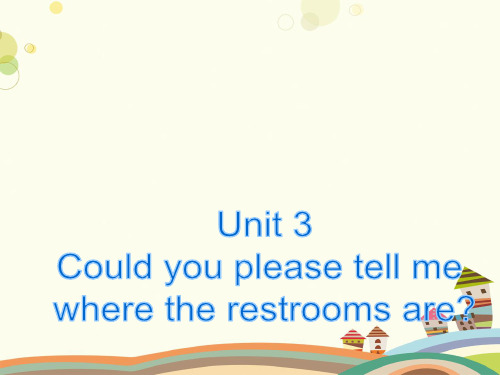
Direct VS. Indirect questions
1. In a direct question, the verb comes before the subject. e.g. Where should we go next?
2. In an indirect question, the subject comes before the verb. e.g. I wonder where we should go next.
a little earlier
It is always ______ at eibguhstyo’clock.
Role-play the conversation.
1. I was scared at first, but shouting did help. 起初我好害怕,但大声喊还是很管用的。
don’t get up till / until 10 o’clock
I _________________________ every Sunday morning.
3. I suggest Water City Restaurant in Water World. 我建议(去)水上世界的水城餐厅。 suggest v. 建议 suggest doing sth. 建议做某事
【语境应用】完成句子。 1) Please ________________.
请一定要小心。 do be careful 2) I __________________.
我完全同意你的意见。 3) He ____d_o_a_g_r_e_e_w__it_h_y_o_u____, remember?
人教版九年级全册英语Unit3-Could you please tell me……暑假预习讲义

人教版九年级全册英语Unit3Could you please tell me where the restroomsare 暑假预习讲义基础知识一、单词1.restroom=washroom n.洗手间(公共) bathroom 洗手间(私人)toilet 厕所(英国人多用)2.stamp n.邮票(C)collect stamps收集邮票3.store n.商店(C)bookstore n.书店4.beside prep.在...旁边besides除了(包括在内)except除了(排除在外)5.pardon 原谅Pardon?=Pardon me.请再说一遍6.normally adv.通常normal adj.正常的7.rush v.n.急促,匆忙rush to do匆忙做某事in a rush匆忙8.suggest v.建议suggestion n.建议(C)suggest(sb)doing建议做某事9.staff n.全体员工(用法类似与family)10.grapes n.葡萄11.central adj.中心的center n.中心12.nearby adj./adv.附近13.mail n.v.邮件;邮寄e-mail电子邮件send an e-mail发送电子邮件14.east东west西south南north北15.fascinating adj.迷人的16.expensive=dear adj.贵的inexpensive=cheap adj.便宜的17.crowded adj.拥挤的uncrowded adj.人少的,不挤的crowd n.人群18.convenient adj.方便的It’s convenient to do方便做某事19.mall n.购物中心,商场20.corner n.角落,拐角in the corner在拐角(内部)at the corner在拐角(外部)21.polite adj.礼貌的politely adv.礼貌地impolite adj.不礼貌的impolitely adv.不礼貌地22.request v.n.要求request sb to do要求某人做某事23.direct adj.直接的;直率的director n.导演direction n.方向sense of direction方向感24.correct adj.正确的v.纠正,修改25.speaker n.发言者speak+语言26.whom pron.谁who pron.谁whose pron.谁的27.address n.住址,地址28.underground n.地铁(英) subway n.地铁(美)29.Italian n.意大利人adj.意大利的Italy n.意大利30.course n.课程Of course.=Certainly.=Sure.当然二、重点短语1.pass by 路过,经过2.parking lot停车场3.a pair of一双,一副4.on the right在右边5.turn left左转6.start with以...开始7.look scary看起来吓人8.not...until直到...才9.at that time在那时10.be busy doing忙于做某事be busy with忙于某事11.For example,例如12.,such as例如13.spend时间、金钱doing14.lead into导入15.look forward to doing期待做某事16.on time准时17.in time及时18.in different situations在不同情况下19.a good place to eat一个吃饭的好地方20.get to=arrive at/in=reach抵达21.mean to do打算,企图22.mean doing意味着23.kind of=a little有点三、重点句型及语法1.if主将从现、主情从现、主祈从现If you’re scared,shout or hold my hand.If you study hard,you can get good grades. If it is sunny,we will go out.2.助动词do,does,did肯定句中表强调Shouting did help.喊叫确实有帮助I do love you.我真的喜欢你3.委婉语气Could you please help me?肯定回答:Sure./Certainly./Of course./No problem./Yes,please.否定回答:Sorry,I can’t./I’d love to,but...否定句:Could you please not smoke here?4.四大花费人pay钱for物:I paid ten dollars for it.人spend时间、金钱on sth/(in)doing sth:I spent ten dollars on it.=I spent ten dollars(in)buying it.物cost人钱:The pen cost me ten dollars.take:It took him an hour to get there.5.宾语从句的判断动词、介词、形容词后面加的句子都是宾语从句,有类动词后面加两个宾语,把指物的宾语变成句子也是宾语从句,容易跟定语从句混淆,下面是常见的可以加双宾语的动词:tell sb sth=tell sth to sbshow sb sth=show sth to sbgive sb sth=give sth to sbsend sb sth=send sth to sbpass sb sth=pass sth to sbbuy sb sth=buy sth for sb基础过关一、单选题1. I often doubt ______ he says.A. whether to believe whatB. whether should I believe whatC. if to believe whatD. whether to believe that2. Can you explain ?A. why should children do choresB. why children should do choresC. what should children do choresD. what children should do chores3. —Did Alice tell you ______ to get to the station?—Yes, she said we would meet there at ten.A. howB. whatC. whenD. where4. —Could you please tell me ______ I can buy some stamps?—Yes. There is a post office on the Centre Street.A. whyB. whereC. whenD. how5. —Iˈll have a five-day holiday. But I donˈt know ______.—How about Beijing?A. what to doB. where to goC. when to goD. how to go6. Do you know ________ in the future?A. what will the life be likeB. what the life is likeC. what is the life likeD. what the life will be like7. —Do you know to see the Beijing Opera?—Yes, you can go to Mei Lanfang Theatre.A. when shall we goB. when we shall goC. where can we goD. where we can go8. Would you please tell me ________?A. when did he come homeB. where would he play footballC. when had he seen the filmD. why he didn't watch the game9. —Can you tell me ________? —At the end of July.A. how often he heard from his pen palB. how soon he will be hereC. that he went on vacationD. when you will start your vacation10. Do you know ________?A. where does water come fromB. how do we make electricityC. who is looking foolish nowD. why is there a grin on his face二、完形填空Recently, a woman (1) Angela was leaving a playground with her little son (2) a man caught her with a knife and wanted to rob (抢劫) her. But suddenly a dog (3) out. He saw the dangerous situation and ran to help Angela and her young son."I didn't think the dog would fight against the man, (4) he went at him and barked at the man. It was clear (5) he was trying to help me," Angela said. "I didn't know (6) this man wanted to do, but it is true the dog saved my life."The bad man ran away, (7) Angela went to her car. When she got in her car and tried to drive off, she wassurprised (8) the dog jumped into her backseat, too. He wanted to come home (9) them, it seemed.The dog had (10) tags (标签). Angela believed him to be simply lost (11) his good health. To be safe, Angela took him on the safe side. Angela took him to a shelter (收容所) (12) his owner could easily find him—but nobody comes to pick up the dog, (13) he's coming home with her.For Angela, it doesn't matter (14) the dog came from, just that he was there when she needed him most. She's already named him Angel. To her and her son, that's exactly (15) he is.1. A. names B. name C. naming D. named2. A. that B. when C. how D. where3. A. run B. runs C. ran D. is running4. A. so B. but C. unless D. because5. A. that B. which C. whom D. whose6. A. how B. what C. who D. where7. A. but B. so C. for D. before8. A. see B. seeing C. to see D. saw9. A. for B. to C. on D. with10. A. not B. none C. no one D. no11. A. because B. off C. because of D. of12. A. so that B. such that C. so D. that13. A. if B. so C. as D. with14. A. whose B. where C. who D. what15. A. who B. what C. where D. whose三、阅读理解AI used to live in an area where the public transportation(公共交通) was not very good. If I came back home after 7 pm, I would have to wait in line for about an hour before I was able to take public transport or taxis. Because the line would be so long, there were many special taxis that would come by and offer to take people home without waiting so long, but the price was so high that not everyone could afford it every day.One day, I worked overtime. When my work was done, it was 9 pm. There was no public transport and I felt so tired that I wanted to return home quickly to have a good sleep. So I took one of this kind of taxis. When I arrived, the driver didnˈt ask me to pay and he just did it as an act of kindness. He said that he didnˈt ask those who took his taxi after 9 pm to pay. His father had done it before and he found it such a nice thing to do that he decided to continue it himself.I felt so touched by his words. There were no words for me to express how thankful I was. He made me feel so good during the following days because of that free ride.I decided to do acts of kindness myself which might have the same influence on me as this one had.1.Which was not the reason why the writer took this special taxi?A. He didn't have to wait long.B. He spent less on the ride.C. He was really tired.D. He wanted to get home earlier2.What can we know about the driver's father?A. He lived a poor life.B. He used to be a taxi driver.C. He often worked overtime.D. He always helped the poor.3.According to the passage the writer will ________ after being helped.A. stick to his dreamsB. treasure what he hasC. face difficulties bravelyD. do good things for others4.How did the writer feel when he wrote the text?A. Sorry.B. Shy.C. Thankful.D. Worried.5.What's the best title for the text?A. A Lesson from a Wrong ChoiceB. Don't Trust StrangersC. It's Better to Give than to ReceiveD. An Unexpected Free RideBThe self-driving tour has become a good choice to spend the holidays for people who are tired of traditional ways. They choose to have a good time traveling by car.About twenty years ago, most people in our country went on a trip in a tour group. It was an easy way for tourists to visit several places, because the travel agency(旅行社)could arrange everything for them, including hotels and plane tickets. There was a bus that could take them to different places during the trip.With the development of our country, people's lives become better and better. Most families at least have one car. People also find that they used to spend more time shopping than looking around because of the travel agency's arrangement. They often stayed in one place for a short time and had a quick look. Now more and more people choose self-driving tours. They can go wherever they like and plan their trips freely.However, there are also some disadvantages of this new traveling way. People have to pay more because it's not easy to book the cheapest tickets or hotels by themselves. And there are many kinds of cost on the road. If they meet some troubles, they have to deal with it themselves. Besides, driving for a long time can be a tiring thing. It's good for people to have at least two drivers in a car, so that they can drive in turn.6.If you want to go on a holiday in a special way, you can ______ according to the text.A. book plane tickets by yourselfB. travel to one place by trainC. go on a tour by carD. join a travel group7.What does the underlined word "arrange" mean?A. celebrateB. cancelC. shareD. plan8.Why do people travel in a tour group?A. Most of them have private cars.B. They can have more time to go shopping.C. They can take a bus to travel among places during a trip.D. They can enjoy themselves visiting many places of interest in a day.9.If you want to have a self-driving tour, itˈs not easy to ________.A. plan the time of your tripB. book hotels with the lowest priceC. go anywhere you like and stay longerD. decide where to live and have dinner10.What is the text mainly about?A. How people spend their holidays.B. The advantages of self-driving tours.C. Why people like traveling by car.D. Two different ways of traveling.四、阅读填空What food do you eat every day? Do you eat (1) (health) food? The US photographer (摄影师) Greg Segal asks students what they eat every week. Then, he (2) (take) photos of the students and their food. Segal wants to use them to ask students (3) (eat) healthy food.Colorful fruit and vegetables help (4) (we) keep healthy. Green is good for our (5) (eye). And it gives us strong bones and teeth. Blue and purple help us remember things (6) (good). They are good for our eyes, (7) . Red gives us healthy hearts. Yellow and orange give us (8) (many) vitamin C.For packaged(包装的) food, look at the ingredients(成分) first. Don't eat food (9) too many unhealthy ingredients. The winter vacation(寒假) is coming. You can write down or take photos of your food for one week. That way, you can know (10) you eat clearly.五、句型转换1.Peter doesn't know. Where does the electricity come from? (改为宾语从句)Peter doesn't know where from.2.What are they doing? Tom didn't tell me. (改为宾语从句)Tom didn't tell me they doing.3.Could you tell me his address? (同义句转换)Could you tell me ?4."Where can you buy so many grapes?" I asked Alice.I asked Alice she buy so many grapes.5.Ruby asked Jack, "What are you looking for?"Ruby asked Jack ________ ________ ________ ________ ________.答案一.ABCBBDDDDC二.D、B、C、B、A、B、B、C、D、D、C、A、B、B、B三.B、B、D、C、D C、D、C、B、D四.1.healthy2.takes3.to 5.eyes6.well7.too8.much9.with10.what五、electricity comeswhat werewhere he liveswhere couldwhat he was looking for。
九年级英语全册 Unit 3 Could you please tell me where the
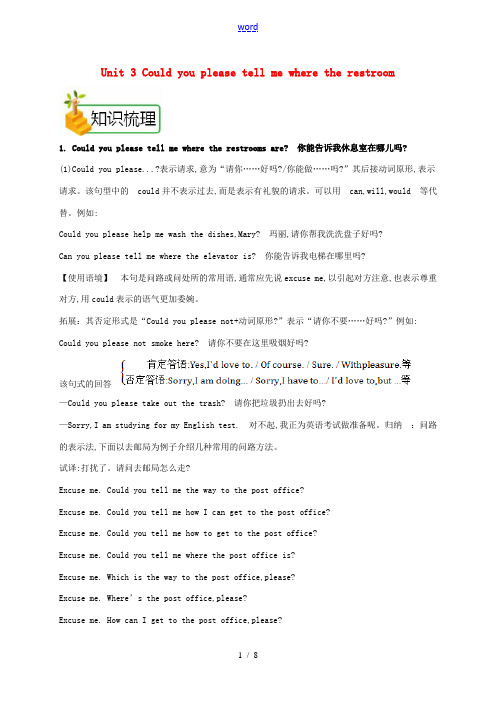
Unit 3 Could you please tell me where the restroom1. Could you please tell me where the restrooms are? 你能告诉我休息室在哪儿吗?(1)Could you please...?表示请求,意为“请你……好吗?/你能做……吗?”其后接动词原形,表示请求。
该句型中的could并不表示过去,而是表示有礼貌的请求。
可以用can,will,would 等代替。
例如:Could you please help me wash the dishes,Mary? 玛丽,请你帮我洗洗盘子好吗?Can you please tell me where the elevator is? 你能告诉我电梯在哪里吗?【使用语境】本句是问路或问处所的常用语,通常应先说excuse me,以引起对方注意,也表示尊重对方,用could表示的语气更加委婉。
拓展:其否定形式是“Could you please not+动词原形?”表示“请你不要……好吗?”例如: Could you please not smoke here? 请你不要在这里吸烟好吗?该句式的回答—Could you please take out the trash? 请你把垃圾扔出去好吗?—Sorry,I am studying for my English test. 对不起,我正为英语考试做准备呢。
归纳:问路的表示法,下面以去邮局为例子介绍几种常用的问路方法。
试译:打扰了。
请问去邮局怎么走?Excuse me. Could you tell me the way to the post office?Excuse me. Could you tell me how I can get to the post office?Excuse me. Could you tell me how to get to the post office?Excuse me. Could you tell me where the post office is?Excuse me. Which is the way to the post office,please?Excuse me. Where’s the post office,please?Excuse me. How can I get to the post office,please?(2)这是由where引导的宾语从句,从句应该用陈述语序。
初三英语上册(人教新目标)Unit-3-Could-you-please-tell-me-where-the-restrooms-are-知识点总结
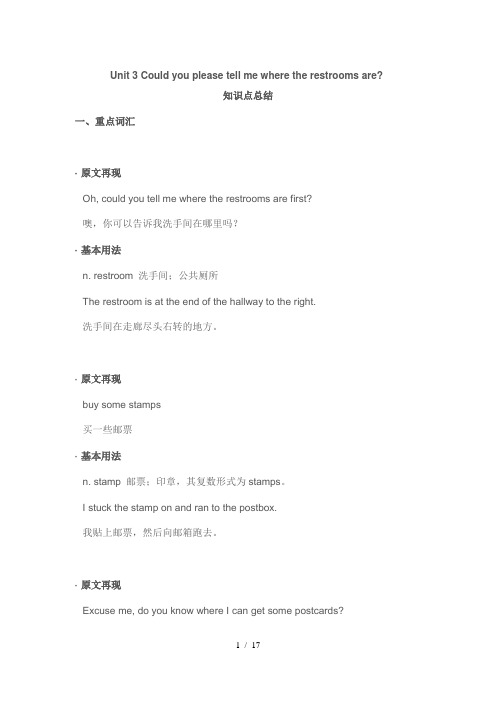
Unit 3 Could you please tell me where the restrooms are?知识点总结一、重点词汇·原文再现Oh, could you tell me where the restrooms are first?噢,你可以告诉我洗手间在哪里吗?·基本用法n. restroom 洗手间;公共厕所The restroom is at the end of the hallway to the right.洗手间在走廊尽头右转的地方。
·原文再现buy some stamps买一些邮票·基本用法n. stamp 邮票;印章,其复数形式为stamps。
I stuck the stamp on and ran to the postbox.我贴上邮票,然后向邮箱跑去。
·原文再现Excuse me, do you know where I can get some postcards?请问,你知道我从哪里可以得到一些明信片吗?·基本用法n. postcard 明信片It was very considerate of you to send me a postcard. 你想得真周到,寄给我明信片。
·原文再现Pardon?请再说一遍。
·基本用法interj. 请再说一遍;抱歉,对不起。
---Will you let me open it?我能打开它吗?---Pardon?请再说一遍?----Can I open it?我能打开它吗?·原文再现I mean … you know, a washroom or bathroom.我的意思是……你知道,洗手间。
·基本用法n. bathroom 浴室;洗手间She has gone in to use the bathroom.她去洗手间了。
九年级英语全册 Unit 3 Could you please tell me where the

3. Where does Bill come from? Do you know? (改为含有(hán yǒu) 宾语从句的复合句) Do you know__________ __________ __________ __________ ? 4. “Do you often chat online? ”Jack asked me. (改为含有(hán yǒu) 宾语从句的复合句) Jack asked me__________ __________ often__________ __________ . 答案: 3. where Bill comes from 4. if I; chatted online
第八页,共26页。
【自主归纳】 (1)suggest后可接名词作宾语, 即suggest sth. 意为“建议……”。 (2)suggest后可接动名词作宾语, 即suggest doing sth. 意为“建议做某 事”。 (3)suggest 后 接 that 从 句 , 且 that 从 句 用 “ should+ 动 词 原 形 ” 结 构 (jiégòu), should可省略, 表示“建议……”。
第五页,共26页。
3. ——你能告诉我乐队今晚什么(shén me)时候开始演奏吗? —__________ __________ tell me when the band__________ __________ this evening? ——在晚上八点开始。 —It starts__________ 8: 00 p. m. 答案: Can you; starts playing; at
第十五页,共26页。
三、巧辨“两面孔” if和when既能引导状语从句, 又能引导宾语从句。 1. 引导宾语从句, 表示(biǎoshì)将来时, 常用一般将来时。 2. 引导状语从句, 表示(biǎoshì)将来时, 常用一般现在时表 示(biǎoshì)将来。
